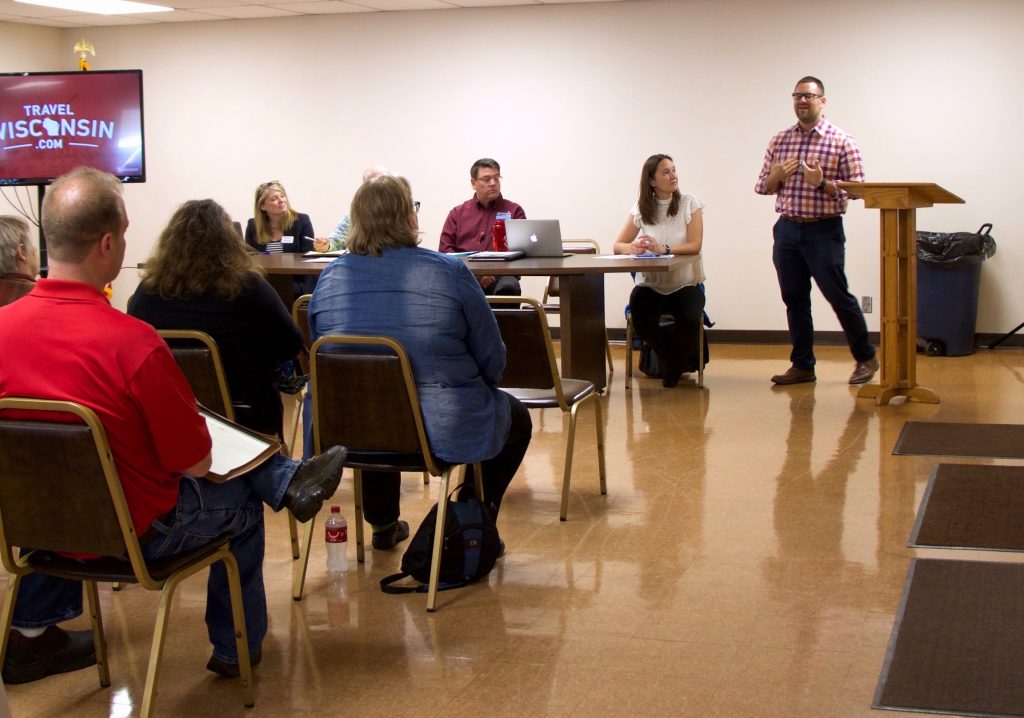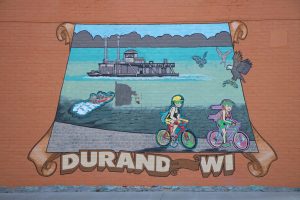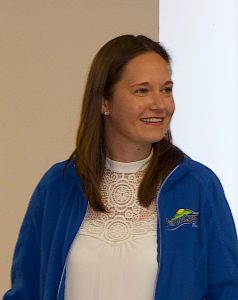
On Aug. 28, Pepin County and the University of Wisconsin–Madison showcased their collaboration in Durand, the county seat along the Chippewa River. “UniverCity Year applies the enthusiasm and expertise in Madison to the problems of one municipality at a time,” says UW’s Gavin Luter, managing director of the UniverCity Year program.
Developed with the Wisconsin Idea in mind, UniverCity Year brings together faculty, students, and members of Wisconsin communities to address local challenges through university courses and research.
“Communities identify issues and problems important to them,” Luter says. “We help document them, and explore solutions that may not be obvious.”

The first year of the three-year project, now completed, was devoted to identifying issues and planning. In discussions with UniverCity Year, Pepin County chose two fields: Economic development and environmental sustainability.
“Pepin County is excited about the potential of our economic development projects to help support our efforts to promote Pepin County and our small local businesses,” says Maria Nelson, who plays several leadership roles in the Pepin County Land Conservation and Planning Department.
Nelson, who spearheaded Pepin’s application to the UniverCity Year program, adds, “We’ve had an ongoing community conversation about water-quality and groundwater contamination, and we are looking to build county and community capacity to improve economic development.”
UniverCity Year is not a free lunch, Nelson points out. “This is creating a tremendous amount work for us, and will be a challenge for our rural community, but we believe it could have positive long-term impacts, so we are willing to take the risk.”
When the project is completed, in 2020, “We hope we will have some solutions that can be implemented, that lead to positive outcomes, cleaner water, ways to protect groundwater that people trust, believe in, and implement. In economic development, we want to be working toward the same goals, to provide better opportunities for business, and for people who live here.”

UW-Madison alumna Maria Nelson is emergency management director, zoning administrator and land information officer in the Pepin County Land Conservation and Planning Department. In deciding to apply to UniverCity, Nelson saw how it had benefited other Wisconsin municipalities. Photo by Kelly Rupp
The ultimate measure of success, Luter says, “is that the leadership tells us it was a good experience, that our reports were helpful in moving the community forward: ‘We put some things that your students said into grant material. We started using your material to help set broader community priorities.’ We don’t want this to end when the project does.”
With UW–Madison about to open the fall session, 11 faculty are poised to tackle 16 projects in those fields, in close collaboration with Pepin County, the City of Durand and the village of Stockholm. Topics include:
The community brand: Kristin Runge, UW–Madison Division of Extension
Through surveys, meetings and interviews, Runge will work with a committee of local stakeholders to develop a brand identity for the City of Durand. “The committee will articulate differentiates Durand from other, similar communities,” she says. “We will ask, ‘What is Durand’s identity?’ The idea is to help people in the community to communicate about Durand from a common perspective.”
The goal, Runge says, is to “identify what it is about Durand that makes it special. Why is it that people live there? Why do they stay in Durand? How does Durand differ from other communities in the region?”
By the conclusion, Runge will develop a “brand book” that “becomes source material for communication when Durand looks to attract new business, or the school district hires a new teacher, or a realtor shows a house to a potential new resident. The book will help them speak with one voice about the community.”
Composting: Andrea Hicks, assistant professor of civil and environmental engineering
To examine composting of manure and yard waste, two classes in environmental engineering will look at the environmental, economic and societal impacts of current practices, and compare them to the results of proposed innovations.
“We did a site visit earlier this month to understand the issues,” Hicks says. “We will look at their assessment of citizen desires, at what they have tried in the past, which will affect our suggestions for changes. Our goal is not to make decisions, but to help them assess these sustainability issues at a level that small counties often cannot do for lack of resources. Potentially, a successful project will support an application for funding to advance the ideas we and the county develop together.”
Community revitalization: Alfonso Morales, professor of planning and landscape architecture
Morales will lead a graduate-level class as it focuses on ways to increase community vitality, defined as creating a more attractive downtown that appeals to new business and residents alike. “Rural economic development is tricky since populations are decreasing and aging, but folks are proud of their rural places and happy to make them attractive to tourism and business,” Morales says.
One outcome will be a guidebook to economic development resources. “We will catalog state and regional programs, loans and grants applicable to business development, using a planning process that supports other UniverCity projects,” Morales says. The guidebook will be formatted and documented for easy updating by County officials. The class will also provide the City of Durand with actionable options for a more enticing downtown.
UniverCity Year operates with generous support from American Family Insurance as well as UW–Madison’s Baldwin Wisconsin Idea Endowment, COWS, Nelson Institute for Environmental Studies, and alumnus John Holton.
David Tenenbaum |University Communuications